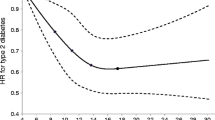Abstract
People who consume a diet rich in fruit and vegetables have lower risks of cancer, cardiovascular disease and all-cause mortality. Many prospective cohort studies have reported inverse associations between dietary intake or blood levels of beta-carotene and risks of cancer. Several large-scale trials were set up to assess whether beta-carotene supplementation might reduce the risk of cancer. Subsequently, evidence emerged from basic research which indicated that oxidative modification of low-density lipoprotein cholesterol increases its atherogenicity. The evidence from basic research, and epidemiological evidence for a possible protective effect of antioxidant vitamins for cardiovascular disease was strongest for vitamin E. More recently, further trials were set up to examine if supplementation with anti-oxidant vitamins might also reduce the risk of cardiovascular disease. This review summarises the available randomised evidence from published trials of beta-carotene supplementation involving 70,000 people from 3 large-scale trials in healthy populations and on vitamin E supplementation involving 29,000 patients at high-risk of cardiovascular disease from 5 large-scale trials. The results of these trials have been disappointing and failed to confirm any protective effect of these vitamins for either cancer or for cardiovascular disease.
Similar content being viewed by others
References
Doll R, Peto R. The Causes of Cancer. Oxford: Oxford University Press, 1981.
Peto R, Doll R, Buckley JD, Sporn MB. Can dietary betacarotene materially reduce human cancer rates? Nature 1981;290:201–208.
Steinberg D, Parthasarathy S, Carew TE, Khoo JC, Witztum J. Beyond cholesterol. Modifications of low-density lipoprotein that increase its atherogenicity. N Engl J Med 1989;320:915–924.
Jialal I, Norkus EP, Cristol L, Grundy SM. Beta-carotene inhibits the oxidative modification of low-density lipoprotein. Biochim Biophys Acta 1991;1086:34–38.
Steinberg D. Antioxidants in the prevention of human atherosclerosis. Summary of the proceedings of a National Heart, Lung and Blood Institute Workshop: September 5-6, 1991, Bethesda, Maryland. Circulation 1992;85:2337–2344.
Reaven PD, Khouw A, Beltz WF, Parthasarathy S, Witztum JL. Effect of dietary antioxidant combinations in humans. Protection of LDL by vitamin E but not by beta-carotene. Arteriorscler Thromb 1993;13:590–600.
Steinberg D. Clinical trial of antioxidants in atherosclerosis: Are we doing the right thing? Lancet 1995;346:36–38.
Stamfer MJ, Hennekens CH, Manson JE, Colditz GA, Rosner B, Willett WC. Vitamin E consumption and the risk of coronary disease in women. N Engl JMed 1993;328:1444–1449.
Rimm EB, Stampfer MJ, Ascherio A, Giovannucci E, Colditz GA, Willett WC.VitaminEconsumption and the risk of coronary heart disease in men. N Engl J Med 1993;328:1450–1456.
Knekt P, Reunanen A, Jarvinen R, Seppanen R, Heliovaara M, Aromaa A. Antioxidant vitamin intake and coronary mortality in a longitudinal population study. Am J Epidemiol 1994;139:1180–1190.
Kok FJ, de Bruijn AM, Vermeeren R, et al. Serum, selenium, vitamin antioxidants and cardiovascular mortality: A 9-year follow-up study in the Netherlands. Am J Clin Nutr 1987;45:462–468.
Salonen JT, Salonen R, Penttila I, et al. Serum fatty acids, apolipoproteins, selenium and vitamin antioxidants and the risk of death from coronary artery disease. Am J Cardiol 1985;56:226–231.
Riemersma RA, Wood DA, MacIntyre CC, Elton RA, Gey KF, Oliver MR. Risk of angina pectoris and plasma concentrations of vitamin A, C, and E and carotene. Lancet 1991;337:1–5.
The Alpha-Tocopherol, Beta-Carotene Cancer Prevention Study Group. The effect of vitamin E and beta-carotene on the incidence of lung cancer and other cancers in male smokers. N Engl J Med 1994;330:1029–1035.
Omenn GS, Goodman GE, Thornquist MD, et al. Effects of a combination of beta-carotene and vitamin A on lung cancer and cardiovascular disease. N Engl J Med 1996;334:1150–1155.
Hennekens C, Buring JE, Manson JE, et al. Lack of effect of long-term supplementation with beta-carotene on the incidence of malignant neoplasms and cardiovascular disease. N Engl Med J 1996;334:1145–1149.
Stephens NG, Parsons A, Scholfield PM, et al. Randomised controlled trial of vitamin E in patients with coronary disease: Cambridge Heart Antioxidant Study. Lancet 1996;347:781–786.
Rapola JM, Virtamo J, Ripatti S, et al. Randomised trial of alpha-tocopherol and beta-carotene supplements on incidence of major coronary events in men with previous myocardial infarction. Lancet 1997;349:1715–1720.
GISSI-Prevenzione Investigators (Gruppo Italiano per lo Studio della Sopravvivenza nell'Infarto Miocardico). Dietary supplementation with n-3 polyunsaturated fatty acids and vitamin E after myocardial infarction: Results of the GISSIPrevenzione trial. Lancet 1999;354:447–455.
Collaborative Group of the Primary Prevention Project. Low-dose aspirin and vitamin E in people at cardiovascular risk: A randomised trial in general practice. Lancet 2002;357:89–95.
The Heart Outcomes Prevention Evaluation Study Investigators. Vitamin E supplementation and cardiovascular events in high-risk patients. N Engl J Med 2000;342:154–160.
Author information
Authors and Affiliations
Rights and permissions
About this article
Cite this article
Clarke, R., Armitage, J. Antioxidant Vitamins and Risk of Cardiovascular Disease. Review of Large-Scale Randomised Trials. Cardiovasc Drugs Ther 16, 411–415 (2002). https://doi.org/10.1023/A:1022134418372
Issue Date:
DOI: https://doi.org/10.1023/A:1022134418372




